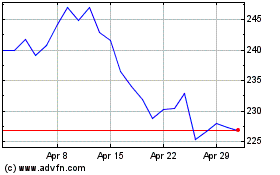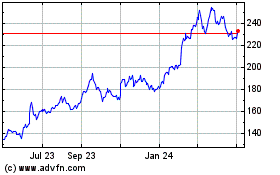Toyota Suffers From Share Losses -- WSJ
February 07 2019 - 3:02AM
Dow Jones News
Car business rolls along, but company's cross-holdings weigh on
its bottom line
By Sean McLain
This article is being republished as part of our daily
reproduction of WSJ.com articles that also appeared in the U.S.
print edition of The Wall Street Journal (February 7, 2019).
TOKYO -- Toyota Motor Corp. said its car business was holding up
against headwinds in the U.S. and China, but it sharply cut its
full-year net profit projection because its shares in other
companies lost value.
Japan's largest car maker now expects to earn Yen1.87 trillion
($17 billion) for the year ending March 31, down from a previous
projection of Yen2.3 trillion.
The value of Toyota's shareholdings dropped by about $3.6
billion in the October-December quarter when global stock markets
were falling. Toyota, like many Japanese companies, often owns
shares in its suppliers and business partners. Those companies may
own shares in Toyota as well. These cross-shareholdings are seen as
a symbolic sign of the partnerships, but can affect the bottom line
in times of stock-market weakness.
Particularly damaging for Toyota was a sharp fall in KDDI Corp.,
one of Japan's big three mobile-phone service providers, which has
faced pressure from the government to cut prices. Toyota held 11.7%
of KDDI as of Sept. 30, 2018. Also, Toyota owns about one-sixth of
fellow auto maker Subaru Corp., whose stock price fell sharply
because of recalls and lower profit margins in the U.S.
Toyota said it wasn't inclined to unload shareholdings to reduce
risk. "There is significance to owning shares," said Masayoshi
Shirayanagi, Toyota's head of accounting. "We might hold it for the
long term, for policy reasons."
In the October-December quarter, revenue was up 2.6% over the
same period a year earlier, while net profit fell 81% because of
the stock-market losses and the absence of a one-time gain in the
earlier period connected to U.S. tax-law changes.
For the year ending March 31, Toyota expects revenue of Yen29.5
trillion and operating profit -- the money it makes from selling
cars -- of Yen2.4 trillion, both roughly the same as the previous
year.
In the U.S., Toyota is looking at ways to shore up its sales.
The company expects to sell around 2.4 million vehicles in North
America, a decline of roughly 50,000 units year-over-year.
Unsold cars are building up on U.S. dealer lots as the new-car
market slows down. The industry expects new-car sales this year to
drop below 17 million for the first time since 2014, leading some
auto makers to trim production.
Toyota didn't provide forecasts for North American production,
but it produced slightly fewer vehicles in the region in the
April-December period compared with the previous year. Toyota said
the decrease was partly due to a shutdown at its factory in Canada
to prepare for the new RAV4 sport-utility vehicle.
Toyota said sales were holding up in China, where the car market
has reached a plateau after years of rapid growth. But another
Japanese auto maker, Mazda Motor Corp. pointed to the risks of
China's slower-growing economy, saying sales there fell by about
20% in the April-December period.
Mazda expects profit for the full fiscal year ending in March to
fall by about half compared with the previous year. Executives said
Wednesday the company had to use incentives to stay competitive in
the U.S. and cut output for the Chinese market to prevent inventory
from piling up.
--Chieko Tsuneoka contributed to this article.
Write to Sean McLain at sean.mclain@wsj.com
(END) Dow Jones Newswires
February 07, 2019 02:47 ET (07:47 GMT)
Copyright (c) 2019 Dow Jones & Company, Inc.
Toyota Motor (NYSE:TM)
Historical Stock Chart
From Jun 2024 to Jul 2024

Toyota Motor (NYSE:TM)
Historical Stock Chart
From Jul 2023 to Jul 2024
